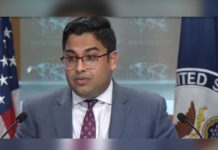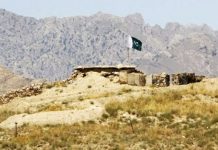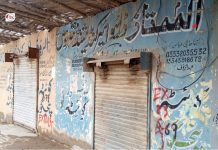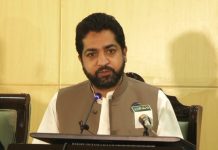TTP spreads wings in Balochistan — TBP Report
Author: Zaarain Baloch
The Tehreek-i-Taliban Pakistan (TTP) shared a statement on their social media account announcing that a band of mujahideen from Balochistan’s Makran region have joined the group and declared loyalty to its cause. Led by an unknown figure named Mazar Baloch, the band swore loyalty to the group at the hands of a Taliban leader with a rather long name, Abu Mansur Asim Mufti Noor Wali Mahsuud Hifzullah. The TTP congratulated the new fighters in their ranks and said they would further TTP’s reach in Balochistan.
Tehreek-i-Taliban Pakistan, an umbrella organization of various Islamist militant groups operating in Afghanistan and Pakistan, has been actively extending its reach in Balochistan, attempting to gain ground there. TTP has lambasted the Pakistani state for its oppression of the Baloch people, plundering their resources, the rampant abduction and killing of Baloch activists and political workers and the militarization of Balochistan. The group has expressed sympathy and extended a hand of friendship to Baloch “pro-independence” armed groups.
There is an old adage that goes something like this: “The enemy of my enemy is my friend.” And it seems TTP is trying to make new friends in Balochistan.
Secular Balochistan and the rise in extremism
Throughout its centuries-old history, Balochistan has never been home to religious extremism and intolerance. It is a multi-ethnic entity comprising people who come from different backgrounds, worship different gods, and speak different tongues. And yet, these people have lived together in harmony for generations and respected each other’s cultures and traditions. The Baloch pride themselves on their secular culture.
But in the past few decades, Balochistan’s secular environment has been eroded. There has been a documented rise in religious fundamentalism, sectarian violence and hate crimes. The trend began in the latter half of the twentieth century but gained pace after the US invasion of Afghanistan in 2001. Islamist outfits from the neighbouring country sought refuge in the border regions, and from there, they penetrated deep into Balochistan.
To understand the root cause of religious extremism in Balochistan, it is important that it should not be thought of as a sudden rise, but as a phenomenon that developed over multiple decades. Balochistan has historically been a secular region, but it began to transform in the mid-1970s. Balochistan borders Afghanistan, and Afghan mujahideen were given a safe sanctuary in the region by Pakistan, a response to the Afghan government’s soft spot for Baloch nationalists.
As Sajid Hussain, a Baloch journalist who died in Sweden in 2020 in mysterious circumstances, explained in an interview with The Diplomat: “At the time of General Zia-ul-Haq (1977-88), when religious extremism came to Pakistan, Balochistan was not badly affected by Zia’s policies. What did have an impact was the arrival of Afghan refugees in Quetta or elsewhere in the province. From the Pashtun belt of Balochistan up to Sibi, religious elements or, to be more specific, mujahideen elements brought with them the sentiments of jihad.”
Besides the northern parts of Balochistan, Afghan refugees also poured into areas near the border, making these regions more susceptible to religious extremism.
According to Hussain, the first buds of religious extremism sprouted in Kech, followed by Chaghi and Nushki. Initially, these developments focused on countering pan-Shia-ism in these areas. Pan-Shia-ism is the idea that Iran is promoting Shia Islam in Balochistan, and Sunni (Salafi) armed outfits believe the only way to counter this is by killing the Shia Hazaras who visit Iran for pilgrimage. Amongst the Iranian Baloch, there are religious groups involved in nationalism, since the Baloch community is predominantly Sunni living in Shia Iran, Hussain explained.
Unlike their compatriots on this side of the border, the Baloch in Iran who are fighting for their rights are not secular – they are, more or less, Islamists. Several Sunni groups are active in the area near the border, and they have carried out attacks inside Iran. Tehran holds Pakistan, the USA and Saudi Arabia responsible for these attacks.
General Zia’s rule may not have affected the Baloch society, but it proved to be disastrous for the politics of Balochistan, as he encouraged and supported religious parties throughout his rule. Niamat Gichki, a Baloch author, told The Diplomat in an interview that: “During the days of Zia, in Balochistan, for the first time, different ideas were sponsored against other sects in Balochistan, particularly Zikri Baloch. Annually, religious clerics would go to Turbat for functions like “Khathme Nabuwwat” (Finality of the Prophethood).”
He added, “Basically, it was used for election tactics because in Balochistan’s Makran division nationalists were winning. That was why the political parties and government of Islamabad thought that nationalists were winning with the support of Zikris. So, by cutting their relations with Zikri Baloch, they were creating rifts by weakening the strength of Baloch nationalists so that the nationalists would lose. They continued to do that, and they succeeded to some extent to break this bond between them. They also bribed the Zikri sects of Muslims. But it was short-lived.”
Zia died in 1988, but his policies remained intact. The clerics began using the Zikri card and started haunting the community. In the 1990s, Zikris faced persecution and the wrath of religious fundamentalism. But the extremists never got what they wanted because the Makran division, where Zikris are populated and their religious sites are located, are traditionally secular areas with high literacy rates relative to other areas of Balochistan.
Pakistan’s counterinsurgency strategy
The Pakistani state has also encouraged and promoted Islamist outfits in Balochistan to countervail the influence of Baloch nationalists and “pro-independence” groups. This strategy has had profound consequences – it has created an environment of religious intolerance and sectarian conflict in Balochistan. It has also backfired on the Pakistani state because the religious groups have turned their guns back on their masters.
The religious outfits have carried out numerous attacks in Balochistan, the deadliest being the killing of Siraj Raisani, a pro-military politician hailing from the Balochistan Awami Party. Raisani was killed in a suicide attack at a rally in Mastung in 2018, where 149 others died and 186 were injured. The death toll was horrific – entire families were wiped out in the attack. In some homes, no men were left to lead the funeral prayers.
The Islamic State – also known as Daesh – claimed responsibility for the attack, citing Raisani’s relationship with the military. The group has been active and terrorizing Balochistan’s areas bordering Afghanistan. The Islamist outfit’s most targets have been unarmed civilians and Shia Hazaras. Raisani’s killing was the first time it targeted a prominent politician and a crucial military asset.
The religious carnage in Balochistan is also linked with the long and incessant history of insurgency and the resentment against the Pakistani authorities for denying the people of Balochistan access to their resources. The recent uptick in religious and sectarian violence is a direct result of Pakistan’s use of religious extremism for counterinsurgency purposes.
Balochistan has witnessed five waves of insurgency against Pakistan, the most recent wave starting in 2004. The insurgency, which was previously centred in the mountains, has now reached Balochistan’s urban areas. Baloch “pro-independence” groups have adapted and diversified themselves, furthering their influence throughout Balochistan, which has made it extremely difficult for the Pakistani state to quash the insurgency.
The “pro-independence” sentiment intensified after the military killed Nawab Akbar Bugti, a prominent Baloch leader. Pakistan’s security establishment responded by promoting religious fundamentalism in Balochistan and using Islamist groups such as the Taliban, Lashkar-e-Jhangvi, and Lashkar-e-Taiba to promote radical Islam in the region to balance and isolate the Baloch insurgents. But this strategy failed because once these outfits gained some strength, they started haunting their overlords.
The Pakistani state retaliated by killing some leaders of the extremist groups, which only gave rise to a more militant cadre of jihadists. The Pakistani state is deluded that it can control these groups. But the current situation says something completely different.
The Pakistani army has a few Baloch soldiers and officers, so it heavily relies on native proxies such as Siraj Raisani for counterinsurgency operations. The military and intelligence agencies have recruited known criminals, militia leaders, drug traffickers, and feudal lords to form “death squads”, to counter the Baloch insurgents. These “death squads” are notorious for their involvement in “enforced disappearances” of Baloch activists and student leaders, the kill-and-dumps, ransom kidnapping, drug trafficking and armed robberies. In exchange for their services, these groups enjoy a massive cash flow from the military and a free hand to do whatever they want.
One such militia leader is Shafiq Mengal, an infamous militant and a close ally of the military and intelligence agencies. Baloch nationalists blame Mengal for his violent campaigns against Baloch activists, insurgents and the Hazara Shia community of Balochistan. Mengal is accused of the killings of countless civilians and for working in liaison with the security forces to quell the anti-military sentiment in Balochistan. He is also blamed for running a kidnap-for-ransom scheme and extortion operations in Balochistan, and he does all that while maintaining a persona of a pious Muslim.
Shafiq Mengal is only one pawn in the security establishment’s strategy of fostering a culture of religious extremism in Balochistan to countervail the Baloch insurgents. In many ways, the rise in extremism in Balochistan is deliberate – it is purposefully curated and allowed to fester. It has had devastating ramifications for the people of Balochistan, such as rampant human rights violations, the genocide of Shia Hazaras, and a rising culture of intolerance. It has also emboldened groups like the Tehreek-i-Taliban Pakistan, the Islamic State and various others to spread their wings in Balochistan and recruit fighters from the Baloch communities.
Taliban and the ISIS
Balochistan has never been home to religious sectarianism and has been peaceful for all religions and minorities. But after the war in Afghanistan and the rise of the Taliban, Balochistan has become a battleground for religious violence. Several factors are driving the alarming trend of religious extremism in Balochistan, but one concerns Balochistan’s northern regions, specifically the Zhob district, which borders the erstwhile Federally Administered Tribal Areas (FATA). Following the Pakistani military’s Zarb-i-Azb in FATA, the TTP and other Islamist outfits penetrated deep into Balochistan and started regrouping there. As a result, Quetta, the capital of Balochistan, and other cities have witnessed deadly attacks. One example is the bombing at Quetta Civil Hospital in August 2016, which killed over 70 people, most of them lawyers.
It was followed by another attack on the Police Training College which killed 60 cadets. TTP splinter group Jamaat ul-Ahrar – closely associated with ISIS – claimed responsibility for both attacks.
Yet another act of terrorism took place the following month in Khuzdar at the Sufi Shrine of Shah Norani, where more than 50 pilgrims were killed. ISIS claimed responsivity for the attack. It was the third attack by ISIS militants and affiliates in Balochistan in three months, a development that sent shockwaves throughout the region. Balochistan had never known religious fundamentalism of that extent, and the sudden rise in violence was alarming.
A large number of attacks by the Islamic State in Balochistan, the popularity of the Afghan Taliban and the currently active recruitment drive of the TTP in Balochistan are the result of Pakistan’s failed counterinsurgency strategy.
What happens next?
Baloch “pro-independence” groups neither support nor object to the TTP. They have not replied to the Taliban’s offers of forming an alliance, at least not publicly. The insurgent groups have not yet commented on TTP recruiting members from the Baloch communities. But it would not be unrealistic to assume that the Baloch armed groups – who are overwhelmingly secular – would be against the rising religious fundamentalism and sectarian conflict, which entails that they would also be against the TTP extending its reach in Balochistan.
Whatever the case, one thing is clear – if TTP finds a sanctuary in Balochistan, it would embolden other Islamist outfits to establish themselves and gain ground. It would not only shift the attention away from the Baloch cause but also irreparably disrupt the secular environment of Balochistan. Religious fundamentalism has destroyed societies across the globe, and this is not a fate Baloch can afford and definitely they don’t want Balochistan to become another Afghanistan.





























